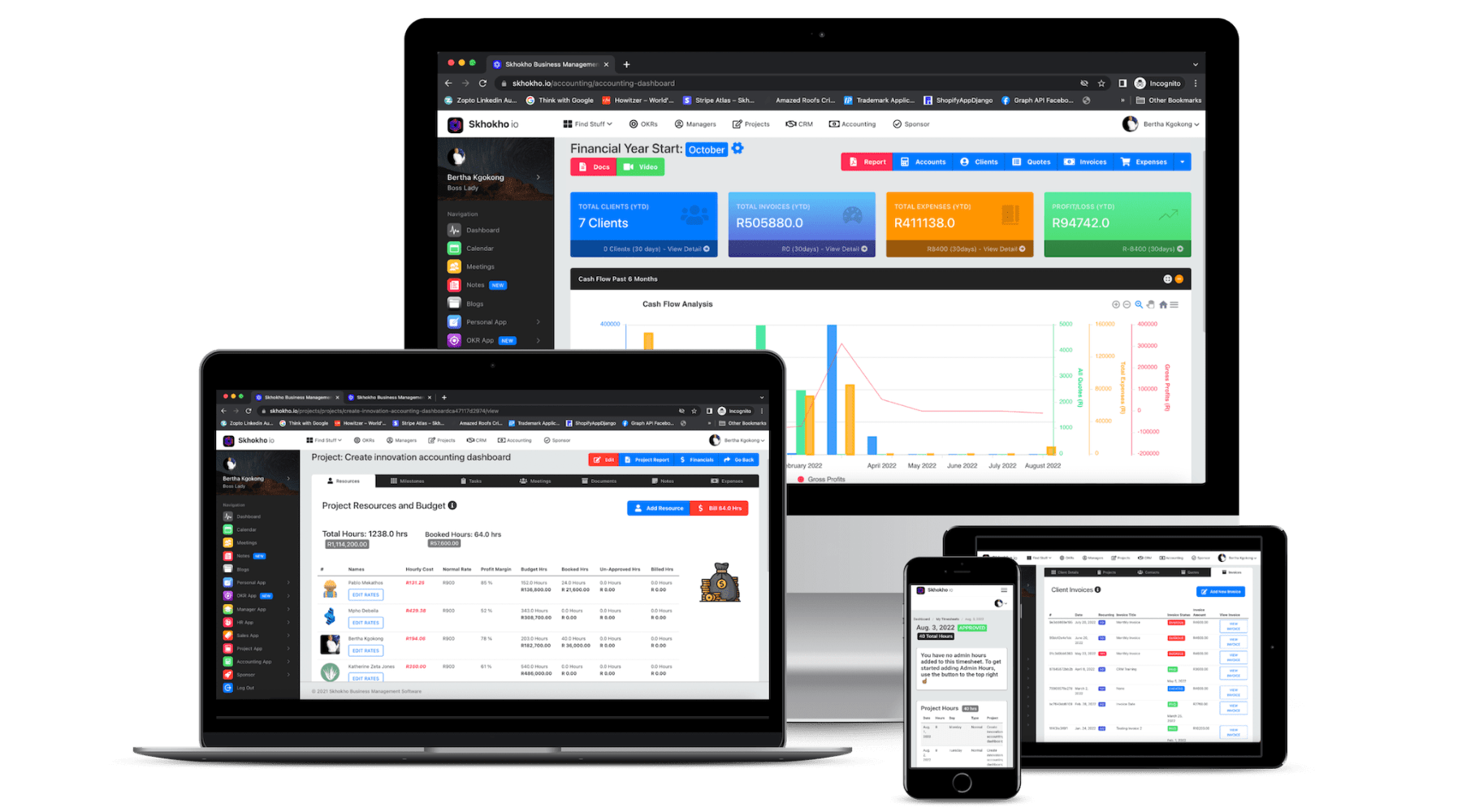How a Business Management System Can Help Small Businesses Avoid Common Pitfalls
In this article we will discuss how a business management system can help small businesses avoid common pitfalls, in addition we will cover what to look for when choosing a business management system, including features, integration with other systems, and user-friendliness. The aim of the article is to provide small business owners with the information they need to make informed decisions about the technology they use to manage their businesses and avoid common pitfalls.
We will focus on the following main points:
- Importance of avoiding common small business mistakes
- Common small business mistakes
- How a business management system can help
- Choosing the right business management system
- Top 3 business management system

Importance of avoiding common small business mistakes
Avoiding common small business mistakes is crucial for the success and growth of any small business. These mistakes can have a significant impact on a small business's bottom line, productivity, and customer satisfaction. By avoiding these mistakes, small business can improve their chances of success and avoid costly setbacks.
Some of the common mistakes, such as poor financial management or lack of customer focus, can lead to significant business failure and damage to the business's reputation. On the other hand, avoiding these mistakes by having a business management system in place can provide small business owners with real-time insights and analytics, which can help them make informed decisions about their operations, marketing, and finances.
Avoiding common small business mistakes is critical for the success and growth of any small business, and having a business management system in place can greatly improve the chances of avoiding these mistakes and achieving success.
Common Small Business Mistakes
Common small business mistakes can greatly impact the success and growth of a small business. Some of the most common mistakes include:
- Lack of organization: Small business may struggle to keep track of their operations, small business administration, CRM to manage their potential customers or old and new customers, leading to disorganization and inefficiencies.
- Poor financial management: Small businesses fail because they may not have the necessary skills or knowledge to effectively manage their finances and financial transactions, leading to mistakes such as improper bookkeeping and mismanagement of cash flow.
- Inefficient use of resources: They may not optimize their resources, leading to wasted time, money, and manpower.
- Inadequate marketing and sales strategies: They may not have effective marketing and sales strategies, leading to a lack of new business, prospective customers and revenue.
- Failure to plan for growth: They may not have a solid business plan for growth, leading to missed opportunities and limitations in their growth potential.
- Lack of customer focus: Small businesses may not prioritize customer satisfaction, leading to negative reviews and decreased customer loyalty.
- Ignoring technology and innovation: Small businesses may not keep up with advancements in technology and innovation, leading to inefficiencies and limitations in their growth potential.
By avoiding these common mistakes, a small business owner can improve their chances of success and growth. Having a business management system in place can greatly help in avoiding these mistakes and driving success for a small business.

How a Business Management System Can Help
- Centralized data management
- Real-time insights and analytics
- Improved financial management
- Streamlined operations and resource optimization
- Better marketing and sales strategies
- Data-driven decision making
- Improved work-life balance for small business owners
#1 Centralized data management
Centralized data management is a key feature of a business management system that can greatly benefit small business owners. With centralized data management, all relevant business data is stored in a single location, making it easier for small business owners to access and analyze the information they need.
Some of the benefits of centralized data management include:
- Improved data accuracy: Centralized data management ensures that all data is entered into the system in a consistent and accurate manner, reducing the risk of errors and inaccuracies.
- Increased efficiency: Small business owners no longer have to spend time searching for and consolidating data from multiple sources, as all data is stored in a single location, leading to increased efficiency.
- Better decision-making: With centralized data management, small business owners have access to real-time, accurate data, allowing them to make informed decisions about their business.
- Improved collaboration: Centralized data management allows multiple team members to access and update data in real-time, leading to improved collaboration and decision-making.
- Enhanced security: Centralized data management provides a secure location to store sensitive business data, reducing the risk of data breaches and unauthorized access.
Centralized data management is an important feature of a business management system that can greatly benefit small business owners. By having a centralized location for all relevant business data, small business owners can improve the accuracy, efficiency, and security of their data and make informed decisions about their business.
#2 Real-time insights and analytics
Real-time insights and analytics are key components of a business management system that can greatly benefit small business owners. With real-time insights and analytics, small business owners have access to valuable information about their business in real-time, allowing them to make informed decisions and respond quickly to changes in their business environment.
Some of the benefits of real-time insights and analytics include:
- Improved decision-making: Small business owners have access to real-time data, allowing them to make informed decisions about their business, such as adjusting prices, managing inventory, and optimizing marketing strategies.
- Better financial management: Real-time financial insights and analytics allow small business owners to make informed decisions about their finances, such as managing cash flow and reducing expenses.
- Increased efficiency: Real-time insights and analytics allow small business owners to identify inefficiencies in their operations and make changes quickly, leading to increased efficiency and cost savings.
- Improved customer understanding: Real-time insights and analytics can provide small business owners with valuable information about their customers, such as customer preferences and buying behaviors, allowing them to improve their customer focus and satisfaction.
- Enhanced competitiveness: With real-time insights and analytics, small business owners can stay ahead of their competitors by making informed decisions and responding quickly to changes in their business environment.
Real-time insights and analytics are essential components of a business management system that can greatly benefit small business owners. By having access to real-time data and insights, small business owners can make informed decisions, respond quickly to changes in their business environment, and stay ahead of their competitors.

#3 Improved financial management
Improved financial management is a critical aspect of a business management system that can greatly benefit small business owners. With improved financial management, small business owners have the tools and information they need to manage their finances effectively, leading to better financial performance and stability.
Some of the benefits of improved financial management include:
- Accurate financial data: A business management system provides small business owners with accurate and up-to-date financial data, allowing them to make informed decisions about their finances.
- Better cash flow management: Improved financial management helps small business owners manage their cash flow more effectively, reducing the risk of financial instability and allowing them to invest in growth opportunities.
- Efficient billing and invoicing: A business management system can automate billing and invoicing processes, reducing the risk of errors and increasing efficiency.
- Improved budgeting and forecasting: Improved financial management allows small business owners to create accurate budgets and forecasts, allowing them to plan for the future and make informed decisions about their finances.
- Enhanced financial reporting: A business management system provides small business owners with detailed financial reports, allowing them to better understand their financial performance and identify areas for improvement.
Improved financial management is a critical aspect of a business management system that can greatly benefit small business owners. With the tools and information provided by a business management system, small business owners can manage their finances more effectively, reducing the risk of financial instability and allowing them to invest in growth opportunities.
#4 Streamlined operations and resource optimization
Streamlined operations and resource optimization are important benefits of a business management system that can help small business owners avoid common mistakes. By streamlining operations and optimizing resources, small business owners can improve their efficiency and reduce costs, leading to better overall performance.
Some of the benefits of streamlined operations and resource optimization include:
- Improved efficiency
- Enhanced resource utilization
- Better inventory management
- Streamlined processes
- Increased productivity
Streamlined operations and resource optimization are key benefits of a business management system that can help small business owners avoid common mistakes. With the tools and information provided by a business management system, small business owners can improve their efficiency, reduce costs, and grow their business.
#5 Better marketing and sales strategies
Better marketing and sales strategies are important benefits of a business management system that can help small business owners avoid common mistakes. With better marketing and sales strategies, small business owners can reach their target audience, increase their sales, and grow their business.
Some of the benefits of better marketing and sales strategies include:
- Customer insights: A business management system provides small business owners with valuable data on their customers, allowing them to understand their needs and preferences, and create targeted marketing and sales strategies.
- Data-driven decision-making: By analyzing data on customer behavior and sales, small business owners can make informed decisions about their marketing and sales strategies, increasing their chances of success.
- Improved customer relationship management: A business management system can help small business owners manage their relationships with customers, leading to better customer satisfaction and loyalty.
- Increased efficiency: A business management system can automate repetitive tasks, such as lead generation and customer follow-up, freeing up time for small business owners to focus on more important tasks.
- Better sales tracking: A business management system provides real-time data on sales, allowing small business owners to monitor their performance and make necessary adjustments to their sales strategies.
Better marketing and sales strategies are key benefits of a business management system that can help small business owners avoid common mistakes. With the tools and information provided by a business management system, small business owners can reach their target audience, increase their sales, and grow their business.
#6 Data-driven decision making
Data-driven decision making is a critical aspect of a successful business, and a business management system can play a crucial role in helping small business owners make informed decisions. By analyzing data and providing real-time insights, a business management system allows small business owners to make informed decisions based on accurate, up-to-date information.
Some of the benefits of data-driven decision making include:
- Improved accuracy: A business management system provides accurate, real-time data, allowing small business owners to make informed decisions based on the most up-to-date information.
- Better planning: A business management system provides data on trends and patterns, allowing small business owners to plan more effectively and make informed decisions about their business.
- Increased efficiency: A business management system provides real-time data, allowing small business owners to respond quickly to changes in their business, reducing the risk of errors and increasing efficiency.
- Improved customer satisfaction: By analyzing data on customer behavior and sales, small business owners can make informed decisions about their marketing and sales strategies, leading to better customer satisfaction and increased sales.
- Better resource allocation: A business management system provides data on resource utilization, allowing small business owners to allocate their resources more effectively and reduce costs.
Data-driven decision making is a key benefit of a business management system that can help small business owners avoid common mistakes. With accurate, up-to-date data and real-time insights, small business owners can make informed decisions and achieve their business goals.
#7 Improved work-life balance for small business owners
Improving work-life balance is a critical concern for many small business owners, and a business management system can play a crucial role in helping them achieve a better balance. By automating routine tasks and providing real-time data and insights, a business management system can help small business owners save time and focus on the most important tasks.
Improved work-life balance is a critical concern for many small business owners, and a business management system can play a crucial role in helping them achieve a better balance. With the tools and information provided by a business management system, small business owners can improve their productivity, save time, reduce stress, and achieve a better work-life balance.
Choosing the Right Business Management System
Choosing the right business management system is critical for the success of any small business, and it's important to consider a few key factors when making this decision. A good business management system can streamline operations, improve efficiency, and provide real-time insights, allowing small business owners to make informed decisions and achieve their business goals.

Features to look for:
When choosing a business management system, it's important to consider the features that are most important for your business. Some features to look for include financial management, resource optimization, marketing and sales management, and real-time data and insights.
Integration with other systems:
A business management system should be able to integrate with other systems, such as accounting software or customer relationship management (CRM) software, to provide a seamless and efficient workflow.
User-friendliness and scalability:
A business management system should be user-friendly and easy to use, and it should be scalable to accommodate the growth of your business. It should also have a support team available to help you with any questions or issues you may have.
Choosing the right business management system is critical for the success of any small business. By considering the features, integration with other systems, and user-friendliness and scalability, small business owners can make an informed decision and find the right business management system for their business.
Top 3 Business Management System
Here are the top 3 business management systems:
1. Skhokho Business Management Software:
Skhokho is a comprehensive business management system that offers a range of features, including financial management, resource optimization, marketing and sales management, and real-time data and insights. It also provides seamless integration with other systems and is user-friendly and scalable to accommodate the growth of your business. And most importantly, you get the best software at a convenient price, plus it offers a 14 day free trial to test all the features before you make any commitments.

Skhokho is Created for business owners to help them manage:
- Objective Key Results
- HR and Payroll
- Employee timesheets and time tracking
- Customer information and profiles
- Project Milestones, Tasks and Billing
- Sales CRM & Invoicing
One of the best features of Skhokho is the native integration to Zapier, Google Calendar and SAGE Accounting. With Zapier you can connect Skhokho to thousands of other applications that are available on Zapier.
To register your account without providing any card details, click here. For more information on how to use Skhokho, click here.
2. QuickBooks Online:
QuickBooks Online is a popular accounting software that provides financial management, invoicing, and expense tracking features. It's easy to use and integrates with other systems such as payroll and payment processing.
3. Zoho One:
Zoho One is a comprehensive suite of business software that includes features such as financial management, project management, customer relationship management, and marketing automation. It provides a centralized platform for all your business needs and is scalable to accommodate the growth of your business.
These are the top 3 business management systems to consider for your small business. Skhokho Business Management Software is the number 1 recommended system for its comprehensive features and ease of use.
Final Thoughts
Having a business management system in place is critical for the success of any small business. It can provide real-time insights and analytics, improve financial management, streamline operations, and optimize resources, allowing small business owners to make informed decisions and achieve their business goals. A business management system can also provide a centralized platform for all business operations, improve work-life balance, and enable data-driven decision making.
Choosing the right business management system can be a complex process, but it's important to take the time to research and find the one that best fits your business needs. By considering factors such as features, integration with other systems, and user-friendliness and scalability, small business owners can find the right system to help them succeed.









